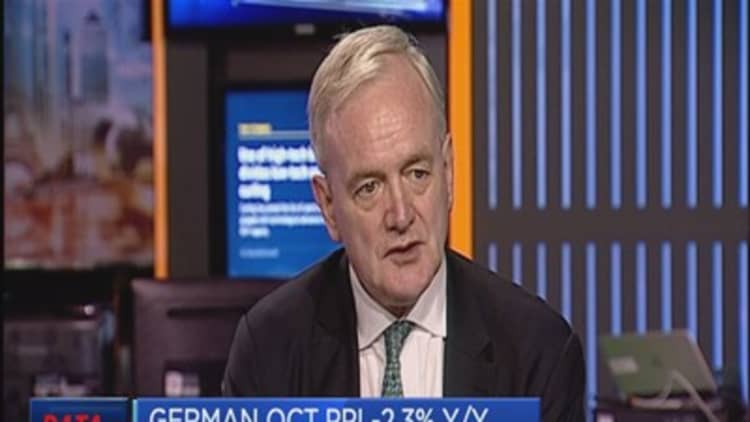
The European Central Bank (ECB) stands ready to act promptly and decisively if it decides that its current policy is failing to stimulate the sluggish euro zone economy, its president Mario Draghi told the region's bankers.
It was the second dovish speech in a week for Draghi, who continues to hint that a ramping-up of the ECB's trillion-euro asset purchase program could be announced in December.
"At the December Governing Council meeting we will thoroughly assess the strength and persistence of the factors that are slowing the return of inflation towards 2 percent. If we conclude that the balance of risks to our medium-term price stability objective is skewed to the downside, we will act by using all the instruments available within our mandate," Draghi said at the Frankfurt European Banking Congress on Friday morning.
"We consider the asset purchase program to be a powerful and flexible instrument, as it can be adjusted in terms of size, composition or duration to achieve a more expansionary stance...if we decide that the current trajectory of our policy is not sufficient to achieve our objective, we will do what we must to raise inflation as quickly as possible."
The euro fell to 1.0683 against the dollar following the speech, after trading near 1.071.
3 risks to inflation
Citigroup Chief Economist Willem Buiter and Moris Kraemer, the chief sovereign ratings officer at S&P, both agreed that the ECB could not solve the euro zone's sluggish recovery on its own and stipulated that government policymakers should be doing more to help.
Buiter told CNBC that Draghi's speech on Friday was "as expected" and said that investors should not "overestimate the power of central banks."
The central banking head also highlighted three risks to the embattled euro zone economy at the Frankfurt speech. He spoke of a "deterioration of the external environment." He said that outlook for global demand, especially in emerging markets, had notably worsened.
He also stated the strength of the underlying euro zone recovery was only "modest." He said the present upswing, which started in 2013, is the weakest euro area rebound since 1998.
Lastly, he said the recovery remained very protracted in a historical perspective. He explained that the Euro area had seen the worst recession since the 1930s and would only return to its pre-crisis level of output in the first quarter of 2016, according to current estimates. He said that it took the U.S. economy 14 quarters to reach its pre-crisis peak, but added that it would have taken 31 quarters for the euro zone to do likewise.
Dovish week for ECB
The minutes of the ECB's last policy meeting - released Thursday - also reinforced the view that the ECB could act in December, The council members said they would re-examine the degree of policy accommodation at its next meeting, according to the minutes, adding that it stands ready to act if necessary.
Growth in the 19-country single currency union has failed to gain any traction following the global financial crash of 2008 and the sovereign debt crisis two years later. The potential for a Greek exit has been quashed with more financial aid packages but the euro zone is yet to reach second gear. Unemployment remains above 10 percent, growth reached a feeble 0.3 percent in the last quarter and inflation is well below to 2 percent target, up a meager 0.1 percent in October.
Speeches this week from ECB members Peter Praet and Yves Mersch have only added to the belief that more easing is coming. Praet, a member of the executive board said that it was essential that "uncertainty does not give rise to indecision" in terms of policy, adding that the central bank stands ready to act in the face of subdued inflation.
Another Governing Council member, Ignazio Visco, even mentioned the recent Paris attacks in a speech Thursday. Recalling the 130 deaths at the hands of the Islamic State last week, he said that it could hurt confidence and may make the recovery of investment in Europe harder to sustain.
David Kohl, chief currency strategist at Julius Baer, is one analyst predicting some major announcements when the ECB meets again in December. He expects the deposit rate to be reduced by 10 basis points to -0.3 percent and the volume of its monthly asset purchases to possibly rise by 10 billion euros ($10.7 billion) to 70 billion euros.
Clarification: The death toll of the Paris attacks has been updated in this story from 129 to 130.




